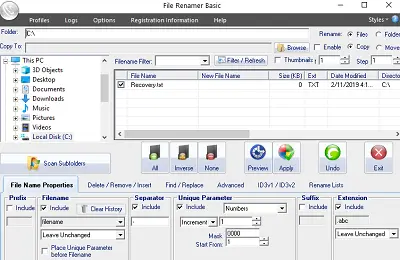
Similarly, to convert filenames to lower case, run: $ rename 'y/A-Z/a-z/' * Yes, the letters in the filenames have been changed from lower case to upper case. Let us check if the changes have been made. To convert all filenames to lower case, so: $ rename 'y/a-z/A-Z/' * If you don't want to overwrite the files, you can simply convert them to upper or lowercase letters (and vice versa) to prevent "already exists" errors. You can force renaming task even if the operation would overwrite existing files using -f flag like below. If so, use -n flag to display which renames would occur without performing them: $ rename -n 's/abc/xyz/' *Īs you can see, the above command didn't make any changes, instead just displays which renames would occur. Sometimes, you might to just print output instead of renaming the files. Now, verify if the changes have been made with ls command. Let us replace the the first occurrence of abc with xyz wherever found. If it is not available by default, run the following command to install it on Debian-based systems: $ sudo apt install renameįor instance, I have the following files in the current directory. The rename command comes preinstalled in most Unix-like operating systems. The rename utility will rename given files by substituting the first occurrence of expression in their name by replacement. $ man mmv Method 2 - Bulk rename files using rename utility This way you can simply verify what mmv command would actually do before renaming the files.įor more details, refer man pages. See? The files abcd1.txt, abcd2.txt, and abcd3.txt have been renamed to xyzd1.txt, xyzd2.txt, and xyzd3.txt.Īnother notable feature of mmv command is you can just print output instead of renaming the files using -n option like below. Let us check if "abc" is actually replaced with "xyz" or not. Please note that in the above example, I have enclosed the patterns in single quotes. You want to replace the the first occurrence of abc with xyz in all files in the current directory.

doc file format in the current directory, simply run: $ mmv \*.txt \#1.doc You can even rename all files with a certain extension to a different extension. Also, you can enclose the patterns with quotes too. In our example, we have only one wildcard (the asterisk), so we write a #1. And, the hash sign should be escaped as well. A ‘#2′ in the ‘to’ pattern would match the second wildcard and so on. It matches the first wildcard found in the ‘from’ pattern. The ‘#1′ in the ‘to’ pattern is a wildcard index. Please be mindful that you must escape the wildcard characters, otherwise they will be expanded by the shell and mmv won’t understand them. We use wildcards, such as ‘*’, ‘?’ and ‘‘, to match one or more arbitrary characters. In the above example, the first parameter ( a*) is the 'from' pattern and the second parameter is 'to' pattern ( b#1).Īs per the above example, mmv will look for any filenames staring with letter 'a' and rename the matched files according to second parameter i.e 'to' pattern. $ lsĪs you can see, all files starts with letter "a" (i.e a1.txt, a2.txt, a3.txt) are renamed to b1.txt, b2.txt, b3.txt.

Let us check if the files have been renamed or not. To rename all files starting with letter "a" to "b", simply run: $ mmv a\* b\#1 Of course, you can do this manually in few seconds.īut just think if you have hundreds of files and want to rename them? It is quite time consuming process. Now you want to rename all files that starts with letter "a" to "b". Let us say, you have the following files in your current directory. To install mmv on Debian, Ubuntu, Linux Mint, and Pop OS, run the following command: $ sudo apt-get install mmv It is available in the default repositories of Debian-based systems. The mmv utility is used to move, copy, append and rename files in bulk using standard wildcards in Linux and Unix-like operating systems. I will keep updating the list if I come across any new method in future. As of writing this, I am aware of 8 different ways to batch rename files. There could be many commands and utilities to a bulk rename bunch of files. There are a few other utilities available to batch rename files in Linux.

What would you do if you wanted to rename multiple files at a time? Worry not! But, the mv command won't support batch renaming files at once.


 0 kommentar(er)
0 kommentar(er)
